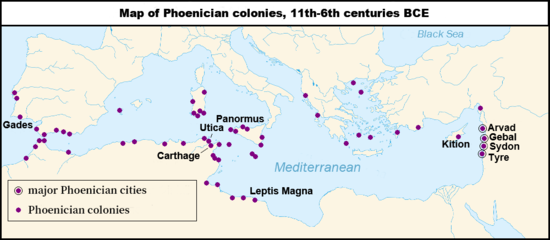phoenicia
THE PHOENICIA PORTAL

Phoenicia (/fəˈnɪʃə, fəˈniːʃə/), or Phœnicia, was an ancient Semitic thalassocratic civilization originating in the coastal strip of the Levant region of the eastern Mediterranean, primarily located in modern Lebanon. The territory of the Phoenicians expanded and contracted throughout history, with the core of their culture stretching from Arwad in modern Syria to Mount Carmel in modern Israel covering the entire coast of modern Lebanon. Beyond their homeland, the Phoenicians extended through trade and colonization throughout the Mediterranean, from Cyprus to the Iberian Peninsula.
The Phoenicians directly succeeded the Bronze Age Canaanites, continuing their cultural traditions following the decline of most major cultures in the Late Bronze Age collapse and into the Iron Age without interruption. It is believed that they self-identified as Canaanites and referred to their land as Canaan, indicating a continuous cultural and geographical association. The name Phoenicia is an ancient Greek exonym that did not correspond precisely to a cohesive culture or society as it would have been understood natively. Therefore, the division between Canaanites and Phoenicians around 1200 BC is regarded as a modern and artificial division.
The Phoenicians, known for their prowess in trade, seafaring and navigation, dominated commerce across classical antiquity and developed an expansive maritime trade network lasting over a millennium. This network facilitated cultural exchanges among major cradles of civilization like Greece, Egypt, and Mesopotamia. The Phoenicians established colonies and trading posts across the Mediterranean; Carthage, a settlement in northwest Africa, became a major civilization in its own right in the seventh century BC.
The Phoenicians were organized in city-states, similar to those of ancient Greece, of which the most notable were Tyre, Sidon, and Byblos. Each city-state was politically independent, and there is no evidence the Phoenicians viewed themselves as a single nationality. While most city-states were governed by some form of kingship, merchant families likely exercised influence through oligarchies. After reaching its zenith in the ninth century BC, the Phoenician civilization in the eastern Mediterranean gradually declined due to external influences and conquests. Yet, their presence persisted in the central and western Mediterranean until the destruction of Carthage in the mid-second century BC. — Read more about Phoenicia, its mythology and language
 Featured article •
Featured article •
A Featured article represents some of the best content on Wikipedia
Siege of Lilybaeum may refer to:
List of Featured articles |
|---|
Phoenician mythology •
Hadad (Ugaritic: 𐎅𐎄 Haddu), Haddad, Adad (Akkadian: 𒀭𒅎 DIM, pronounced as Adād), or Iškur (Sumerian) was the storm and rain god in the Canaanite and ancient Mesopotamian religions. He was attested in Ebla as "Hadda" in c. 2500 BCE. From the Levant, Hadad was introduced to Mesopotamia by the Amorites, where he became known as the Akkadian (Assyrian-Babylonian) god Adad. Adad and Iškur are usually written with the logogram 𒀭𒅎 dIM—the same symbol used for the Hurrian god Teshub. Hadad was also called Pidar, Rapiu, Baal-Zephon, or often simply Baʿal (Lord), but this title was also used for other gods. The bull was the symbolic animal of Hadad. He appeared bearded, often holding a club and thunderbolt while wearing a bull-horned headdress. Hadad was equated with the Greek god Zeus, the Roman god Jupiter (and in the cult-center near Doliche in Asia Minor he was addressed as Jupiter Dolichenus), as well as the Babylonian mythology Bel.
The Baal Cycle, also known as the Epic of Baal, is a collection of stories about the god Baal from the Canaanite area who is also referred to as Hadad, the storm-god. This collection of stories is dated between 1400 and 1200 B.C. and was found in Ugarit, an ancient city located in modern-day Syria. (Full article...)Images
 Good article •
Good article •
A Good article meets a core set of high editorial standards
Phoenician inscriptions & language •
The Nora Stone or Nora Inscription is an ancient Phoenician inscribed stone found at Nora on the south coast of Sardinia in 1773. Though it was not discovered in its primary context, it has been dated by palaeographic methods to the late 9th century to early 8th century BCE and is still considered the oldest Phoenician inscription found anywhere outside of the Levant.
It is conserved at the Museo archeologico nazionale, Cagliari, and is considered particularly notable due to its reference to the name Sardinia in Phoenician. The inscription is known as KAI 46. (Full article...)Did you know (auto-generated) •

- ... that the deity of the Phoenician sanctuary of Kharayeb remains unidentified due to the absence of names of specific gods in unearthed inscriptions?
- ... that coins issued by Baalshillem II, the Phoenician king of Sidon, were the first Sidonian coins to bear minting dates corresponding to the king's year of reign?
- ... that archaeological excavations in the historic town of Kharayeb revealed a rural settlement with a complex system of cisterns and a Phoenician temple?
- ... that the sarcophagus of Eshmunazar II, the Phoenician king of Sidon, is one of only three ancient Egyptian sarcophagi unearthed outside Egypt?
- ... that the Romans copied the Phoenician joints technique from a Punic warship that ran aground in 264 BC?
- ... that alongside a 7th-century BC Phoenician shipwreck, two additional wrecks from various historical periods were unearthed in Bajo de la Campana, situated off the coast of Cartagena, Spain?
Related portals
Categories
Wikiproject
Other Wiki and Wikiportals
This article uses material from the Wikipedia English article Portal:Phoenicia, which is released under the Creative Commons Attribution-ShareAlike 3.0 license ("CC BY-SA 3.0"); additional terms may apply (view authors). Content is available under CC BY-SA 4.0 unless otherwise noted. Images, videos and audio are available under their respective licenses.
®Wikipedia is a registered trademark of the Wiki Foundation, Inc. Wiki English (DUHOCTRUNGQUOC.VN) is an independent company and has no affiliation with Wiki Foundation.























